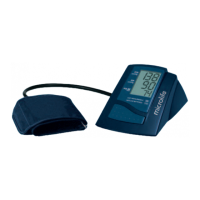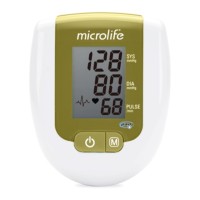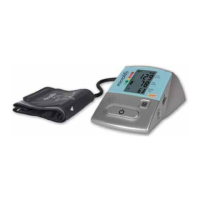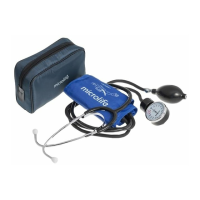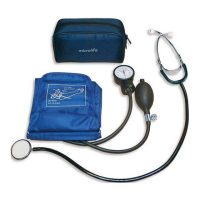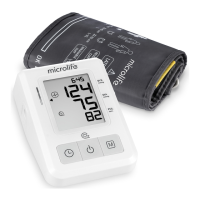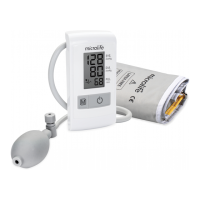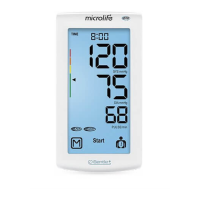21
20
5. How often and when shall I measure my blood pressure with the
Microlife electronic blood pressure monitor?
• The more you measure, the better! But as blood pressure is a
variable body parameter, be aware that the results are not same.
To compare your blood pressure level between each day, you
should perform a daily measurement under comparable living sit-
uations. Measure, for example, an hour after you had dinner.
Make sure that you feel relaxed and not disturbed by environ-
ment.
6. What happens if not place the cuff at heart level?
• It is very important that the cuff is positioned at heart level
during measurement. A position ten centimeters higher than
heart level means an underestimation by 8 mmHg while 10 cen-
timeters below heart level means 8 mmHg overestimation of the
blood pressure.
7. Can I connect any cuff as long as it fits to the connection port?
• Microlife blood pressure monitors can only give reliable results
when the device is connected to a Microlife cuff. Microlife pro-
vides fan shape wide range (M~L Size) cuff for arm circumfer-
ence 22-42 cm.
8. Can I wash the cuff?
• No, the cuffs of home monitors are generally not designed to be
washed. This might change the cuff dimensions and lead to a loss
in accuracy. But under normal application it is not required to wash
the cuff. Spot on the cuff can be removed carefully with a damp
cloth and soapsuds.
9. I already have an AC/AD adapter at home. can I use it or do
I need the Microlife adapter?
• Microlife's blood pressure monitors require a very specific power
supply. This can only be guaranteed by the use of batteries or the
Microlife AC adapter. The adapter is specifically designed for our
products.
BP 3BM1-3 Automatic Blood Pressure Monitor Instruction Manual www.microlife.com www.microlife.com BP 3BM1-3 Automatic Blood Pressure Monitor Instruction Manual
10. Is the MICROLIFE blood pressure monitor waterproof?
• No! Also please prevent to store it above 50°C
‘
11. What are normal results and when should I see a doctor?
• The following table explains the pressure ranges and degree of hypertension according to
the World Health Organization:
Category Systolic blood pressure Diastolic blood pressure
Optimal <120 <80
Normal
<130 <85
High normal 130~139 85~89
Hypertension
_ Stage 1 :Mild 140~159 90~99
_ Stage 2 :Moderate 160~179 100~109
_ Stage 3 :Severe >180 >110
Isolated systolic hypertension >140 <90
• It is recommended that you record your blood pressure values frequently and discuss
them with your doctor. If your systolic values are frequently above 130 and/or the dias-
tolic values above 85, you should consult your doctor. It is normal that blood pressure val-
ues are sometimes higher and lower and there is no need to worry if the results are
sometimes higher than the above limits. But if your pressure is above the limits in most
cases, you should consult your doctor.
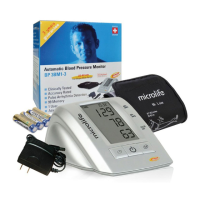
